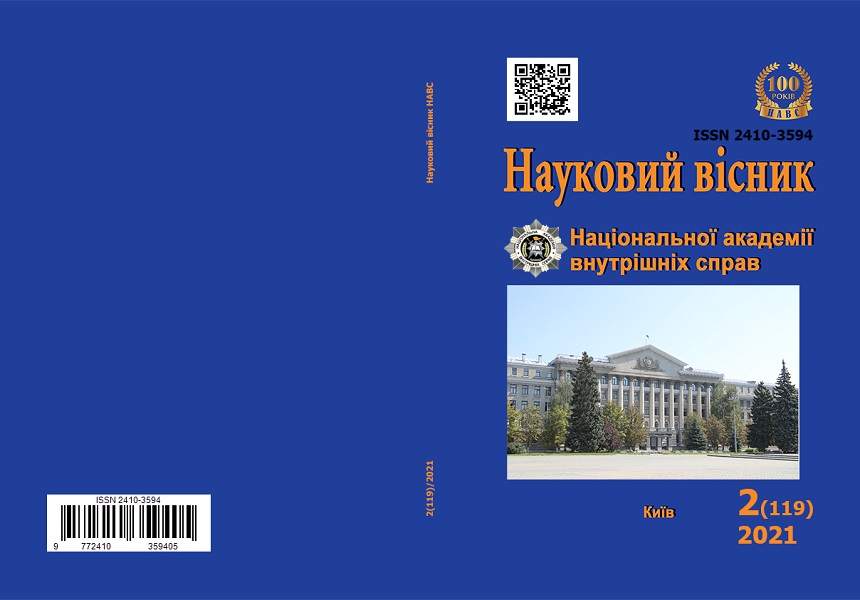Concept, Essence and Significance of the Activity of the Units of Knowledge
Abstract
The purpose, the author of the article, was to analyze the historical, theoretical and regulatory aspects that form the concept, essence and meaning of inquiry as a simplified form of pre-trial investigation. The attention is focused on the previously studied aspects of the relevant topic, attention is focused on the importance of the relevant institution in the functioning of the mechanism for the protection of human and civil rights and freedoms in Ukraine. The scientific novelty of the research lies in the fact that the article substantiates the importance of the functioning of the institute of inquiry, on the basis of statistical data illuminated by the state authorities, it is recorded that the relevant institute fulfills its main task – unloading investigative units, as well as ensuring the restoration of violated human and civil rights and freedoms. The significant developments of foreign researchers of the world's law enforcement systems, as well as the field of criminology, are involved, which interconnect the effectiveness of the functioning of state institutions with the mechanism for protecting human rights and freedoms. It was found that the lack of organizational and administrative interdepartmental normative legal acts to simplify an even larger volume of procedures in the pre-trial investigation of criminal offenses, as well as to improve existing forms of interaction, is a shortcoming in the functioning of the relevant institution. Conclusions. The historical, theoretical and normative aspects that form the concept, essence and meaning of inquiry as a simplified form of pre-trial investigation are analyzed. Several alternative points of view of scientists are investigated, they interpret the main categories, reasonably their own, the author's position regarding the definition of the concept of inquiry, which is characterized as the procedure for actions of a specific authorized subject. The essence of inquiry as a form of preliminary investigation and an organizational and analytical process is argued. The proposed positions of researchers regarding the substantiation of the importance of the relevant institution in the functioning of the state in general and the system of criminal procedure in particular are also consolidated.
Keywords: organizational and legal framework; pre-trial investigation; inquiries; genesis; interpretation of the concept; essence; values; human and civil rights.
Downloads
References
Бойко В. А. Деякі особливості дізнання як форми досудового розслідування. Актуальні проблеми діяльності органів досудового розслідування : матеріали круглого столу (Дніпро, 25 лют. 2021 р.). Дніпро : ДДУВС, 2021. С. 13–15.
Досудове розслідування кримінальних проступків : метод. рек. / [С. С. Чернявський, М. С. Цуцкірідзе, Р. М. Дударець та ін.]. Київ : Нац. акад. внутр. справ, 2019. 160 с.
Чернєй В., Чернявський С. Запровадження інституту кримінальних проступків у контексті реформування системи досудового розслідування в Україні. Науковий вісник Національної академії внутрішніх справ. 2019. № 3 (112). С. 7–14. doi: https://doi.org/10.33270/01191123.7.
Даль В. Толковый словарь живого великорусского языка. М., 1955. 454 с.
Edwards С. Changing policing theories for the 21st centry societies. 3rd edition. Sydney : The Federation press, 2011.
Govender D. State of violent crime in South Africa post-1994. Journal of Sociology and Social Anthropology. 2015. No. 6 (4). P. 459–467.
Govender D. Community-based participatory approach to prevent residential burglaries and house robberies. In Global perspectives on crime prevention and community resilience : International Police Executive Symposium
Co-Publications / in D. S. Peterson, D. K. Das (Eds.). New York : Taylor & Francis, 2018. P. 35–47.
Литвинов В. В. Суб’єкти дізнання у кримінальному процесі України. Актуальні проблеми діяльності органів досудового розслідування : матеріали Всеукр. наук.-практ. конф. (Дніпро, 7 черв. 2019 р.). Дніпро : ДДУВС, 2019. С. 106–109.
Мельник А. В. Розвиток інституту дізнання в Україні. Держава та регіони. 2021. № 1 (71). С. 32–36. (Серія «Право»). doi: https://doi.org/10.32840/1813-338X-2021.1.5.
Miró Llinares F. Inteligencia Artificial Y Justicia Penal: Más Allá De Los Resultados Lesivos Causados Por Robots. Revista De Derecho Penal Y Criminología. 2018. No. 20. P. 87–130. doi: https://doi.org/10.5944/rdpc.20.2018.26446.
Miró Llinares F. Predictive policing: utopia or dystopia? On attitudes towards the use of big data algorithms for law enforcement. Internet, Law and Politics E-Journal. 2020. No. 30. doi: https://doi.org/10.7238/idp.v0i30.3223.
Ожегов С. И. Словарь русского языка. Т. 1. М., 1984. С. 147.
Саковський А. А., Жижин А. В. Взаємодія підрозділів кримінальної поліції та органів досудового розслідування в документуванні кримінальних правопорушень. Науковий вісник Національної академії внутрішніх справ. 2019. № 2 (111). С. 49–54. doi: https://doi.org/10.33270/01191112.49.
Статистична інформація Офісу Генерального прокурора. URL: https://www.gp.gov.ua/ua/1stat.
Про внесення змін до деяких законодавчих актів України щодо спрощення досудового розслідування окремих категорій кримінальних правопорушень : Закон України від 22 листоп. 2018 р. № 2617-VIII. URL: https://zakon.rada.gov.ua/laws/show/2617-19.
Abstract views: 182 PDF Downloads: 213
- Authors reserve the right to authorship of their own work and transfer to the magazine the right of the first publication of this work under the terms of the Creative Commons Attribution License, which allows other persons to freely distribute published work with mandatory reference to authors of the original work and the first publication of an article in this magazine.
- Authors have the right to enter into separate additional agreements on non-exclusive dissemination of the work in the form in which it was published in the journal (for example, to post an article in the institution's repository or to publish as part of a monograph), provided that the link to the first publication of the work in this journal is maintained.
- The journal's policy allows and encourages the posting of articles by authors on the Internet (for example, in electronic storehouses of institutions or on personal websites), both before the submission of this manuscript to the editorial office and during its editorial processing, as this contributes to the creation of a productive scientific discussion and positively affects the efficiency and dynamics of citing the published work.




